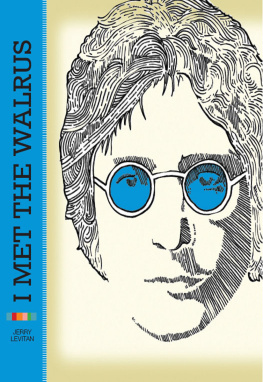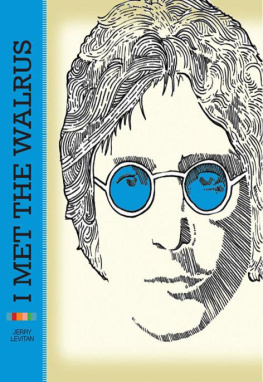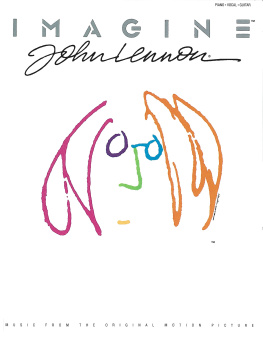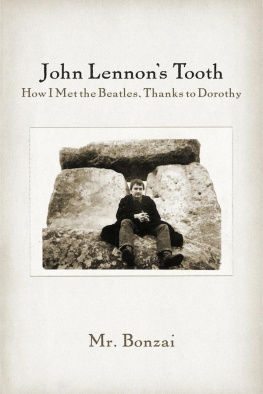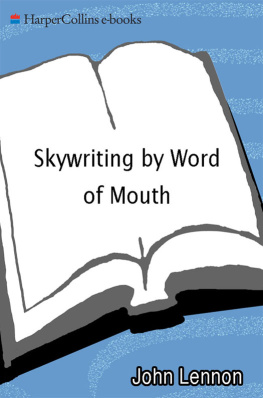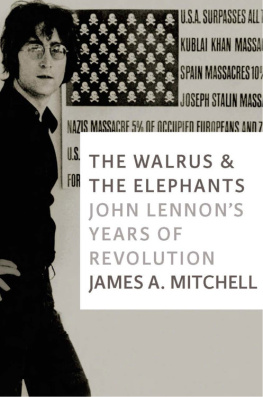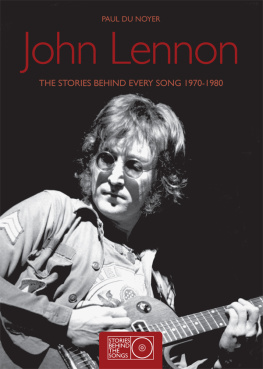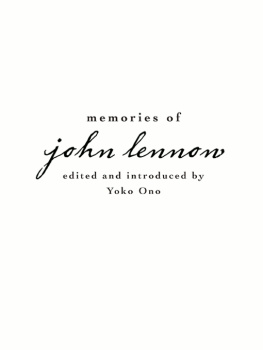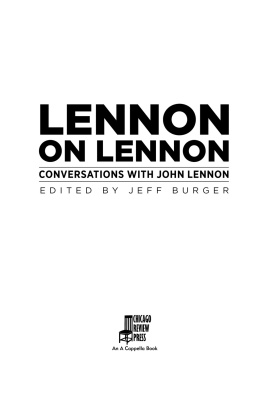I Met the Walrus
How One Day with John Lennon Changed My Life Forever
Jerry Levitan


John and Yoko being interviewed. I had just snuck into their room. Thats the back of my head in the foreground. Jeff Goode/ Toronto Star
TO MY BELOVED PARENTS,
CHONON AND JUDITH LEVITAN.
THEY HAD FAITH IN ME,
BELIEVED IN ME, AND LOVED ME.

My favorite photo. John and Yoko sweetly holding each others hands and looking at each others fingers. I was struck by how beautiful Yoko was.
I REMEMBER FONDLY, HOW YOUNG JERRY CAME TO US AND DID THE INTERVIEW, WHEN SO MANY JOURNALISTS WERE TRYING TO SPEAK TO US. HE WAS NOT ONLY BRAVE BUT VERY CLEAR AND INTELLIGENT. BOTH JOHN AND I THOUGHT IT WAS A VERY PLEASANT EXPERIENCE.
YOKO ONO

John signs his name and draws a caricature of him and Yoko on the Two Virgins album for me. Jeff Goode/ Toronto Star .
Contents
Meet the Beatles
I Met the Walrus
In My Life
Epilogue
I was nine years old when the Beatles first performed on the Ed Sullivan Show in 1964. It was February 9, and like millions of other families in those days, we sat around the TV each Sunday night at 8:00 P.M . to be entertained by that awkward yet strangely captivating impresario. That night there was a special buzz to his show. He was to showcase his latest find, four lads from Liverpool, England, who were taking their country and the music world by storm. The Beatles were something special. Girls screamed and fainted at the sight of them. Their mop-top haircuts made them controversial and gave them a slight edge of mystery and danger. Everyone anticipated their appearance for different reasons. I was practically vibrating from all the excitement.
Sullivan came on the black-and-white TV and in his distinct speaking manner said, This city never has witnessed the excitement stirred by these youngsters from Liverpool who call themselves the Beatles. Ladies and Gentlementhe Beatles! With that announcement, my family and a nation were mesmerized as they opened the show with All My Loving, accompanied by high-pitched, never-ending screams from teenage girls. John, Paul, George, and Ringo were confident and cute as they performed four other songs (Till There Was You, She Loves You, I Saw Her Standing There, and I Want to Hold Your Hand) between the other acts, including a magician performing a card and saltshaker trick, an impressionist, and a comedy acrobatic troupe. The Beatles took my breath away. I had officially witnessed my first great spectacle.
Ringo kept the happy beat on an elevated stage looking down on his mates on a set that had huge arrows pointing at them. Paul played his distinctive, violin-shaped left-handed bass; George was on lead guitar. But Johnstanding in that quintessential Lennon style, defiant, guitar high up against his chest, legs apartwas clearly the bands leader. They bounced to the beat, well dressed in black suits, thin black ties, and pointed Beatle boots. And, relative to most other people at the time, longish wavy hair. This was a new kind of rock and roll star. The camera would cut away to shots of young girls in various fits of ecstasy and insanity, and a smattering of boys, who were in rapt, yet reserved attention. At one point their first names were flashed on the screen under their faces: Paul, George, Ringo, John: Sorry girls, hes married. The cultural phenomenon that was the Beatles was well underway that night as a history-making seventy-three million North Americans tuned in to see what the fuss was all about.
Something happened to me when I saw the Beatles for the first time. Before then my heroes had been comic book characters like Superman and Batman. But the Beatles were something better. They were superheroes with instruments and great musical powers. They were instantly familiar to me and I trusted them immediately. I had found new heroes to worship.
It couldnt have been a better time for the country to meet the Beatles. Just three months before their introduction to North America, the world was jolted by the assassination of President John F. Kennedy. Kennedy represented hope and a new beginning for the baby boom generation.

When JFK died so violently it shocked the world. Canada was no exception. I remember sitting in my classroom in school when an emergency announcement came on from the principal that President Kennedy had been shot and school was cancelled. I left class that day and watched teachers and random people on the street weeping for themselves and the fate of the world. I came home to my devastated mother and aunt. It was as though the world had come to an end. For the burgeoning television generation that I was part of, the coverage of Kennedys assassination and its aftermath was overwhelming. That heavy cloud was the backdrop to Ed Sullivans gift to North America that February night. It has been said so many times before, but the Beatles really were what the Western world was waiting for. Everyone, particularly my generation, needed a reason to believe that the world was a good place, that our lives had meaning, and that our future held promise.
Exposure to pop culture was limited in the early 60s. There was no MTV or VH1only television variety shows, movies, radio, and print. That meant that if you wanted to know what was happening in the music scene you had to listen to your favorite pop radio station, catch the hottest TV show, and speak to your friends to keep up. My brother, Steve, and sister, Myrna, were older and more in tune with what was happening and I went along for the ride. They had the turntable and the records. I had the comics.
Before the Beatles, the pop charts were filled with bouncy pop tunes like crooner Steve Lawrences Go Away Little Girl, the Four Seasons Walk Like a Man, Hes So Fine by the Chiffons, and Blue Velvet by Bobby Vinton. These were sweet, nonthreatening songs that the whole family could love. One-hit wonders sung by finely groomed white teenagers filled the airwaves. It was a far cry from the hip-shaking, lip-snarling Jailhouse Rock of Elvis Presley just a few years before.
Elvis had been drafted into the army in 1958, sent to Germany, and rock and roll had taken a turn for the worse. During his absence the charts were littered with fluff like Venus, Alley-Oop, The Chipmunk Song, and Itsy Bitsy Teenie Weenie Yellow Polkadot Bikini. When Elvis and his particularly deviant music left the scene, the moguls of the recording industrywith some prodding from parent groups and congressmenencouraged a cleaner, whiter diet of all-American pop.

Some musical gems managed to sneak through, however, and many of these reached the Beatles when the Atlantic ships docked in the port of Liverpool bringing goods from America, including records like Kansas City, Will You Love Me Tomorrow, Mack the Knife, Hit the Road Jack, and Please Mr. Postman. It was these songs plus those by Buddy Holly, Chuck Berry, Little Richard, and of course, pre-Army Elvis that had the greatest influence on the Beatles.

